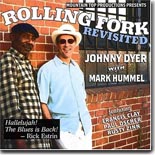 How
did a CD as great as Rolling Fork Revisited (Mountaintop
Productions) slip past all of us??? This Muddy Waters tribute album
by Johnny Dyer with Mark Hummel was released over a year ago. It
first came to my attention when Mr. Dyer played in Phoenix in September
and presented me with a copy of his disc.
How
did a CD as great as Rolling Fork Revisited (Mountaintop
Productions) slip past all of us??? This Muddy Waters tribute album
by Johnny Dyer with Mark Hummel was released over a year ago. It
first came to my attention when Mr. Dyer played in Phoenix in September
and presented me with a copy of his disc.
All I can now say is "better late than
never." This one would have ranked near the front of my top ten list for
2004 if I had heard it last year. Sure, the thought of still another
collection of Muddy's music, no matter how great the original versions
were, might make some readers wonder why. It's all been done before.
You need to put those thoughts aside,
because this loving tribute to the great Muddy Waters is one of the best
I've heard. At times, you need to remind yourself that you're not
listening to Muddy's classic recordings. It's not that Dyer sounds that
much like Muddy (no one ever could), but the spirit and quality of the
originals is there.
Dyer handles all of the vocals but
plays harmonica on only one number. Hummel does most of the harp work,
and is joined on some cuts by former Muddy band members Paul Oscher,
playing mostly slide guitar and some harmonica, and drummer Francis
Clay. Rusty Zinn also sits in on guitar on some cuts. As explained in
the liner notes, those responsible for the disc selected songs that were
heavy on harmonica and slide guitar, giving Hummel and Oscher plenty of
chances to show off.
"Young Fashioned Ways" is one of the
best numbers. Dyer's voice takes on a raw power not heard on other
numbers, Bob Welsh contributes a great Spann-style piano solo, Zinn
provides more intricate guitar licks than on the original version, and
Hummel pumps out a soaring harmonica solo. "Can't Get No Grinding" again
gives Hummel an extended solo and he plays the harp like never before.
"Country Boy" recalls Muddy's earlier,
stripped down trio recordings; Oscher is featured here on slide guitar
and rack harmonica. On "Gone To Main Street," the interplay between
Hummel's driving harmonica and Oscher's playful slide guitar is
intoxicating. Oscher also gets to play some heavy slide on "My Dog Can't
Bark and the slower "Layaway Plan," a song that I don't remember from
Muddy's repertoire.
"Forty Days and Forty Nights" again
finds Dyer in excellent vocal form, with plenty of power in his voice,
while Zinn gives the tune a more contemporary sound with his guitar
work.
"Evans Shuffle," with only Dyer on
harmonica and 'yells' and Oscher on racked harmonica and guitar,
provides a nice, simple ending to a great album.
The musicians involved in this project
didn't try to re-invent the classic Muddy Waters sound. Instead, they
merely delivered loving renditions in the spirit of the originals ...
and they did it very, very well. If you too missed out last year on
Rolling Fork Revisited, then go looking for it. If you can't find
it, then keep searching. It's that good.
--- Bill Mitchell
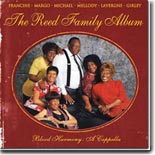 The Reed Family has quite a history in the Phoenix area alone,
whereas individually they have come to mark many musical territories
around the nation. Sometimes its been painful to witness their
adversity: Death (particularly brother Bucko late in 2004), tragedy,
health issues. The good that has clearly come of this is a deeper and
more profound soul in their music. Whether for Christmas, spiritual or
secular listening, The Reed Family Album “Blood Harmony: A Cappella”
(Southwest Musical Arts Foundation Records) is filled with love. The
“ring” of the five or six voices ranks right up there with the best of
choirs or smaller vocal groups anywhere.
The Reed Family has quite a history in the Phoenix area alone,
whereas individually they have come to mark many musical territories
around the nation. Sometimes its been painful to witness their
adversity: Death (particularly brother Bucko late in 2004), tragedy,
health issues. The good that has clearly come of this is a deeper and
more profound soul in their music. Whether for Christmas, spiritual or
secular listening, The Reed Family Album “Blood Harmony: A Cappella”
(Southwest Musical Arts Foundation Records) is filled with love. The
“ring” of the five or six voices ranks right up there with the best of
choirs or smaller vocal groups anywhere.
For a brief history: They began in the ‘40s on Chicago radio as “The
Original Singing Crusaders” led by their father Leonard Reed, becoming
the Reed Family Singers in Kankakee, Illinois. Most of the family came
to Phoenix in the 1970s. Margo and Francine in particular created jazz
followings. Late brother Tony organized the “Reed Family” sound to do
annual concerts at Phoenix Symphony Hall among other venues. Francine
has become known internationally for a long stay with Lyle Lovett, and
lesser with Willie Nelson and Delbert McClinton. Michael continues to
work solo in Phoenix, as does Mellody in Kankakee.
From the recognized to the revved-up, Jesus and prayer are recurring
themes of this CD, gospel the undercurrent. Recorded in March 2005,
sisters Margo and Francine seem to share ring-leading (pun intended) and
it’s amazing (at least in Margo’s case) that there’s no formal musical
training behind this seemingly effortless vocalizing. There is what may
be a gospel novelty, “Rusty Old Halo (and skinny white cloud/robe is so
wooly it scratches).” The most unlikely “Sixteen Tons” appears, other
selections are in suspended, almost non-existent, tempo.
“This Little Light” shines with Margo, then out of church traversing an
old Mills Brothers hit sung Doo Wop style, and on to the street corner
with Rudolph’s nose. From about the same era that still echoes voices
like Al Jolson, Helen Forrest and Judy Garland comes the concluding cut,
“You Made Me Love You,” commencing with Margo’s voice, passed to her by
“Mama Girley.” This is the only track with instrumental accompaniment
inJohn Shea’s piano.
This album is a precious gem; the art of A Cappella singing (voices
only, no instruments) isn’t practiced by many these days, and even more
rarely by “blood” family. Phoenix in particular should revere the
recording, as its people are credited with much inspiration. In the
liner notes by long-time Phoenix/US/European jazz journalist Patricia
Myers, the Reeds thank support groups Phoenix Blues Society and Jazz In
Arizona. Clarke Rigsby has again let it happen in his studio, and
particular kudos must go to producer Bob Corritore, who during a Reed
Family performance at his Rhythm Room immediately knew he had to record
this sound.
To order the CD, visit the
KJZZ site.
---Tom Coulson
Radio broadcaster/musician
comments to tcoulson@ktar.com
There are long solo piano intros, sometimes 16 or 32 bars many times
over, kind of like a gospel structure. But this is no gospel music. A
loud, raw and untrained voice usually enters after these long intros on
each cut. It’s all solo piano accompanied by the player’s own vocal.
Bobby Lounge, born somewhere in the “deep south,” is definitely an
anomaly: From the liner notes, “In 2004 Bobby again became interested in
playing his songs for his friends...” resulting in this one-shot batch
done in at a private residence, with excellent sound quality. The CD
title is quite attractive, I Remember The Night Your Trailer Burnt
Down (Abitian label, spelled BURNED on the back cover).
Unfortunately the humor is so inside it probably will remain “for his
friends.” I do applaud his way of flipping off society by putting a
“parental advisory” warning on a couple tracks, “may not be suitable for
radio or children,” two categories he’ll certainly always be far from.
Somehow the elite-reaching songwriting comes off neither canny or
uncanny.
By track four there is welcome energy, adding variety, with a boogie
woogie piano pattern. And on one hand the fare is classy, due to the top
condition of the fat-sounding acoustic piano and the player’s obvious
prowess, then in the next classless by design.
Dull, pointless stories evolve out of the artist’s clear purposeful
annoyance. His voice is part Randy Newman, another Leon Russell, but
Bobby Lounge doesn’t hit these marks. The whole thing is difficult to
take in whole, much less to repeat. This monotony is compounded by much
of the material being performed in the same key. We almost hear Jerry
Lee sing the track “If I Had Been Elvis,” then the attitude summed up in
the concluding track, “I’ll Always Be Better Than You.”
To his credit, the melody does stay in your head for a moment. But
overall, like a T-shirt with wording designed to offend and instead
displaying the wearer’s mentality, the caustic, vain humor just doesn’t
do it.
---Tom Coulson
Radio broadcaster/musician
comments to tcoulson@ktar.com
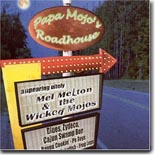 It screams Zydeco from note one, but quickly diverts to other twists and
turns in contemporary blues and other Louisiana-associated styles. It
appears we have an excellent harmonica front-man, with appealing vocal
chops too, in Mel Melton and the Wicked Mojos release Papa
Mojo’s Roadhouse (Louisiana Red Hot Records). At the next level
there’s great guitar slinging: Slide, “tremelo” and conventional
electric solos stand out from a good audio mix (probably a result of
mastering touches done in Nashville). Rhythms are pulled-back, then
shifted to two-step, and group vocals are well-melded in a gumbo of rock
and soul influences. Horns are great additions on several tracks.
It screams Zydeco from note one, but quickly diverts to other twists and
turns in contemporary blues and other Louisiana-associated styles. It
appears we have an excellent harmonica front-man, with appealing vocal
chops too, in Mel Melton and the Wicked Mojos release Papa
Mojo’s Roadhouse (Louisiana Red Hot Records). At the next level
there’s great guitar slinging: Slide, “tremelo” and conventional
electric solos stand out from a good audio mix (probably a result of
mastering touches done in Nashville). Rhythms are pulled-back, then
shifted to two-step, and group vocals are well-melded in a gumbo of rock
and soul influences. Horns are great additions on several tracks.
One of the slow dances is “Things I Used To Do”-type, and New Orleans
themes feel like pre-Katrina moods assured of return, specifically “Hot,
cool, hip-hop, old-school.”
Gambling on horses is another story but we’re always winners within
swampy confines. All music is original by Mel Melton, with assistance on
some, except for one: As expected, Ray Charles continues to be utmost in
mind of recording artists everywhere and the tribute from this disc is
what sounds like a chromatic harmonica instrumental of “What I Say.”
The only flaw seems to be a mix-up in track numbering on the printed
back cover. It’s all labeled “Louisiana Dance Hall Music” and/or “Cajun
Swamp Bop.” Whether delivering a simple backbeat or more regional
specialties, Mel Melton and the Wicked Mojos seem to perform on a
foundation of good old Rock ‘N Roll quite well, and earn high marks.
---Tom Coulson
Radio broadcaster/musician
comments to tcoulson@ktar.com
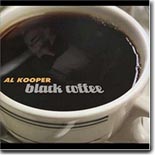 The name is familiar, seemingly from the “This guy’s still around?”
category. Even without going to
www.alkooper.com,
the booklet liner notes for Al Kooper’s 2005 release Black
Coffee (Favored Nation label) thankfully reminds us of his
biographical contributions to an era of influence. This is his first
solo release in 30 years. Brooklyn-born, early writing for Keely Smith
to Gary Lewis to Lulu, thru probably his most-associated work as
keyboardist on Dylan’s “Rolling Stone,” surviving ’60s folk circles, the
first front-man for BS&T, work with the late Michael Bloomfield, playing
on Hendrix’s “Electric Ladyland,” doing the piano work on the Stone’s
“Can’t Always Get...,” discovering Lynyrd Skynyrd, and into lesser-known
but important producing, eventually to the west coast, and associations
with both B.B. King and Ray Charles, yeah, these are ways we’ve heard
this guy.
The name is familiar, seemingly from the “This guy’s still around?”
category. Even without going to
www.alkooper.com,
the booklet liner notes for Al Kooper’s 2005 release Black
Coffee (Favored Nation label) thankfully reminds us of his
biographical contributions to an era of influence. This is his first
solo release in 30 years. Brooklyn-born, early writing for Keely Smith
to Gary Lewis to Lulu, thru probably his most-associated work as
keyboardist on Dylan’s “Rolling Stone,” surviving ’60s folk circles, the
first front-man for BS&T, work with the late Michael Bloomfield, playing
on Hendrix’s “Electric Ladyland,” doing the piano work on the Stone’s
“Can’t Always Get...,” discovering Lynyrd Skynyrd, and into lesser-known
but important producing, eventually to the west coast, and associations
with both B.B. King and Ray Charles, yeah, these are ways we’ve heard
this guy.
This is album rock, not blues, but there are soul touches from his
horns, the “Funky Faculty,” and a little down-home in places with
acoustic slide guitar and mandolin. Add to that great production tricks,
including “fade-ins” at track beginnings. There’s much layered
percussion.
Disc sequencing and segues work, a lot of experience and continued work
has produced a well-conceived result. Personally the experience takes me
back, makes me feel good. The “Black Coffee” background vocalists become
a mini choir on one cut, then there’s a jazzy ballad. A couple
unexpected covers include a live recording of “Green Onions” where
Kooper just squeezes the grit out of the Hammond B3 organ. Then a Ray
Charles hit sung without overdoing imitation.
Actually the leader’s voice is much varied, in one case conjuring up Dr.
John, then maybe Neil Young in the next. You’ll be told a tale of
sadness and woe then get energized with a locomotive rhythm, reminding
one of a better Rare Earth “Get Ready.” Of the disc’s 14 tracks, only
four aren’t written by the leader, and one of these is Smokey
Robinson’s. Kooper’s songwriting is simply excellent, bordering on
brilliant. It’s hippy music for this moment, more electric folk than
pop- or rock-sounding.
---Tom Coulson
Radio broadcaster/musician
comments to tcoulson@ktar.com
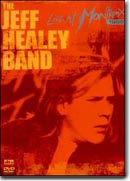 The Montreux Jazz Festival began in
1967. Then, it only ran for three days with a handful of artists. Now it
is one of the world’s most prestigious music festivals, running for more
than two weeks and attracting crowds of over 100,000 people. Eagle
Vision’s Live at Montreux DVD series features concert footage
from some of the best Montreux performances, e.g., Bonnie Raitt, Eric
Clapton, and Dr. John. Jeff Healey is one of the most prolific
blues-rock guitarists. Blind since the age of one, Healey began playing
guitar at three and formed the Jeff Healey Trio by age 20. Their debut
album See the Light was released in 1988. It went platinum and
earned Healey a devoted following among blues-rock fans. Just around the
time sacred steel music was being discovered by blues culture, Healey
was blasting out his own unique guitar fashion.
The Montreux Jazz Festival began in
1967. Then, it only ran for three days with a handful of artists. Now it
is one of the world’s most prestigious music festivals, running for more
than two weeks and attracting crowds of over 100,000 people. Eagle
Vision’s Live at Montreux DVD series features concert footage
from some of the best Montreux performances, e.g., Bonnie Raitt, Eric
Clapton, and Dr. John. Jeff Healey is one of the most prolific
blues-rock guitarists. Blind since the age of one, Healey began playing
guitar at three and formed the Jeff Healey Trio by age 20. Their debut
album See the Light was released in 1988. It went platinum and
earned Healey a devoted following among blues-rock fans. Just around the
time sacred steel music was being discovered by blues culture, Healey
was blasting out his own unique guitar fashion.
On July 3, 1999, the Jeff Healey Band,
featuring, Joe Rockman (bass), Pat Rush (guitar), Tom Stephen (drums)
and Healey, played Montreux. Their 75-minute set is the main feature of
this 100-minute DVD.
During "Stop Breakin’ Down," you realize stage presence-less Pat Rush is
one of Canada’s most under appreciated guitarists. He doesn’t distract
from the musical wonder of Healey, who wanders the stage while filled
with the spirits of Robert Johnson and his own energy. Beginning with
"Third Degree," the guitar is no longer in a support stand, so Healey
sits and plays his crescendo-ing instrument while holding it in his lap.
This distinctive technique involves all four fingers and thumb being
used on the fret board. If there was rocket fuel on or near the stage
during this tune, these guys would have ended up in orbit. John Hiatt’s
"Angel Eyes" is one of the best modern rock ballads.
In concert, Healey’s deep vocals are
just as strong as in the studio. Harmonizing guitars are pure bliss for
fans of the bended, pushed, and pulled string. "Roadhouse Blues is one
such dueling double guitar attack with searing solos that may frighten a
few listeners away. During "See The Light," the music explodes with too
much screeching guitar.
As a bonus, the DVD includes four songs filmed at a 1997 Montreux
performance. On "As The Years Go Passing By" Healey accentuates his
inflective voice, and turns his guitar into an electrified lightning
rod. Both concerts are professionally filmed, and contain excellent high
definition cinematography. By the use of amazing close-ups, you will see
Healey’s baffling finger dexterity, which crawl along the fret board
like a spider. The concerts are also available on CD, but less three
songs from the DVD. However, "Yer Blues" is only available on CD. The
Jeff Healey Band’s sound is raw and heavy, but then again they are four
white guys from Canada. Overall, the music is more rock than blues, but
fans of electric guitar will be ecstatic.
--- Tim Holek
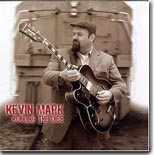 The province of Quebec has a treasure
trove of undiscovered blues artists. Although many of them have been
performing and recording for years, most are not known outside of the
province. One example is the venturing Kevin Mark. With a full
bodied guitar and a considerable voice, Mark is a big man with a big
sound. He requires a lot of band behind his powerful guitar. Seven
musicians support him on his 50-minute sophomore release, Rolling The
Dice (Blue Hog). The three man horn section (Little Frankie
Thiffault, Mario Allard, and Paul Nedzela) seem to be having a blast,
and they do more than simply provide fills. Throughout, Michael
Fonfara’s skillful keyboards tingle away in the background courtesy of
Jack de Keyzer’s adept production.
The province of Quebec has a treasure
trove of undiscovered blues artists. Although many of them have been
performing and recording for years, most are not known outside of the
province. One example is the venturing Kevin Mark. With a full
bodied guitar and a considerable voice, Mark is a big man with a big
sound. He requires a lot of band behind his powerful guitar. Seven
musicians support him on his 50-minute sophomore release, Rolling The
Dice (Blue Hog). The three man horn section (Little Frankie
Thiffault, Mario Allard, and Paul Nedzela) seem to be having a blast,
and they do more than simply provide fills. Throughout, Michael
Fonfara’s skillful keyboards tingle away in the background courtesy of
Jack de Keyzer’s adept production.
Like most of the songs, "So Blue Without You" bops and swings with
lively horns and expressive piano. "Mean Mistreater" comes with a hint
of rhythm from "Mustang Sally." "Big Blue Cadillac" combines the past
times of music, cars, and sex. The lyrics of "I’m So Broke" contain many
clichés, yet they are entertaining. You will enjoy this party song about
a sad situation. The horns acquire Memphis soul on "Searching For My
Baby." The song is one of the album’s highlights, as is Thiffault’s
vibrant sax solo. Laurier Gagnon adds Hound Dog Taylor-like slide guitar
to "You’re So Mean." These 13 songs (including 11 Mark originals)
contain material to get you out on the dance floor. Ballroom dancers
will especially enjoy "I Want You To Be My Baby."
Although swing music (like any genre) has its limitations, the powerful
tone of Rolling The Dice is sure to establish Mark as a triple
threat (singer, songwriter, guitar player) on the Canadian blues music
scene.
--- Tim Holek
When American blues bands land a gig
in Paris’ Le Meridien Etoile Hotel’s chic Lionel Hampton Jazz Club, it
is a feather in the band’s cap. For many, it is a career highlight. On
March 27, 2003, Henry Gray And The Cats performed there and it
was captured on a DVD and CD entitled Live In Paris (Lucky Cat).
No one can play traditional blues better than seasoned veterans, who
were raised on it and who have lived it. Henry Gray hails from just
outside New Orleans. At the age of eight, he began to demonstrate his
talent on piano. In 1956, he joined Howlin' Wolf’s band and remained
there until 1968. Gray is considered by many as one of the best living
exponents of the Windy City piano blues style. The Cats include Paul
“Lil’ Buck” Sinegal (guitar), Brian Bruce (harmonica), Earl Christopher
(drums), and Andy Cornett (bass). Overall, they are a timeless band that
still gets dressed up for their performances. Gray may not know many
chords, but he and his Cats are a class act and the real deal when it
comes to the blues.
The sole Gray original, “Showers of Rain,” is performed like a group of
guys half their age. Here, Henry lays down some of his signature upper
registry notes. Gray’s vocals are weathered and dampened on “It Hurts Me
Too,” but his piano is a pummeling barrelhouse. “Lil’ Buck”’s smooth
guitar is perfected and so unobtrusive that it distinctively stands out.
Obviously, the band is having a blast during “Sweet Home Chicago.”
Gray’s bass notes and Buck’s riffs fit together like a glove on a
stomping rendition of “Rock Me.” Though Gray cannot recall all the
lyrics to “Key To The Highway,” it is valiantly performed by request.
With just brief pauses between the 14 songs, there is minimal
interaction with the crowd as one song blends into another.
Six of the songs are also present on Gray’s Live – Blues Won’t Let Me
Take My Rest CD from 1999. All but one of the 14 tracks are covers.
Keep in mind that this film/recording was made and produced for a
European audience. The band has distribution rights, but didn’t get a
chance to select the material. On top
of this, the crowd seems real subdued and almost sedated – the clientele
looks more interested in the martinis than the blues. The hidden treasure here is renowned Louisiana
guitarist “Lil’ Buck” Sinegal, who spent many years in the bands of
Clifton Chenier and Buckwheat Zydeco. Sinegal is credited as a sideman
on over 300 recordings in each decade since the 1950s.
Overall the piano, harp, and guitar are dazzling, yet no one needs to
showboat. The musicians aren’t allowed to detract from the band, which
keeps the focus on the songs. They are all experienced musicians with a
solid sense of timing. This CD/DVD has captured some house rocking
American music, which is to be treasured as it is a dying entity. Blues,
R&B, and old time rock ‘n’ roll fill the 55-minute disc. There isn’t a
bulk of diversity in these songs. Yet you will cherish them for their
open-ness, honesty, and authenticity.
This is some of the best traditional
blues I have heard since listening to Willie Smith’s Bluesin’ It
CD. For further info, refer to
www.luckycatproductions.com or
www.henrygray.com.
--- Tim Holek
Wayne Baker Brooks creates power blues by
taking early electric Chicago blues, and combining it with Texas rock
and modern day R&B. On his debut CD, Mystery (Blues Island), the
35-year-old singer / songwriter / guitarist assaults the listener with
contemporary blues. His passionate, booming
vocals complement his wicked yet tasteful lead guitar. Wayne’s musical
debut was made at the age of five, when he played percussion on boxes,
pots, pans, and spoons. By the time he was 21, Wayne began playing
guitar and concentrating on a career in music. He is the youngest son of
blues superstar Lonnie Brooks and has been a regular member of The
Lonnie Brooks Blues Band since 1998. Wayne’s other talents include
founding Blues Island Productions, running a Blues In The Schools
program, and co-authoring the Blues For Dummies book.
Many musical directions are taken on the opening
cut and title track of Wayne’s debut CD. This might have you thinking
Baker Brooks is having an identity crisis. Far from it, he is just being
himself. Beginning with "Nu Kinda Blues," Baker Brooks really
comes into his element on the record. The song is performed
“Chicago Style” and it’s vibrant. The tune is essentially an
instrumental with Ben Ruth’s thriving harp mixed in with a dance club
beat, and sound effects by D.J. Ajax. Wayne Baker Brooks takes what
Chris Thomas King and Chuck D. started to a higher ground. This
unconventional land will definitely attract today’s youth. He first
combined funk, rap, and blues while D.J.’ing for his classmates. At
times on his debut, he sounds like the cross-product of Michael Jackson,
Luther Allison, and Jimi Hendrix. Ultimately, the self-taught musician
combines elements of various roots music. Then, he adds his own essence
in order to create a pioneering sound that is cool with today’s record
buying youth. A fine example of this is found on "You Made It Easy,
Baby."
Charging horns add extra power and dramatics to
"Your Turn (To Talk To The Blues)." Like a jolt received from an
electric shock, the horns and Baker Brooks’ vocals punch out on it.
"Sooner Or Later" has a catchy main groove with an infectiously
repetitive hook. It is a power rock song where the guitar solos crank
and blaze like Harvey Mandel. Background singers add bootylicious funk
to "Tell Me." It features a rock heavy rhythm, pounding drums, and a
slicing guitar solo. The danceable "Baby Stop" has backing vocals, which
are as funky as its rhythm. Lyrically, "Just Lika Butterfly" is a new
twist on the old problem of unfaithfulness. "Exiled" reveals the soft,
mean, and assertive sides of this vegetarian’s voice. "It Don’t Work
Like That" is a catchy little blues-rock ditty with a jagged hook. Yes,
the enchanting guest performing searing guitar on the song is Lonnie
Brooks. Throughout, Brother Ronnie provides energetic rhythm guitar.
Mystery is blues-based, but as Baker Brooks
is a young and diverse contemporary musician, the sounds of hip-hop and
rock strongly feature throughout it. The 13 original songs are good and
indicate Baker Brooks has strong potential as a songwriter. Wayne knows
where he is going with his lyrics. He doesn’t simply view them as just
being the words of the songs. At this point in his career, the rhythms
and guitar solos are more powerful than the vocals. On his radical
debut, Baker Brooks excels at combining dance club beats with his blues
inspirations.
--- Tim Holek
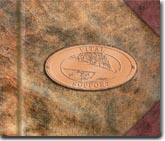 Vital Support is known best for
their role as Carl Weathersby’s backing band. The group’s name was
christened in 1996. Now, only Calvin “Skip” Gaskin (bass) remains from
the original incarnation. Paul Hendricks (guitar) has been a band member
since 1999. To date, Vital Support’s most prosperous years were from
2000-2003 when they performed up to 260 dates a year. They did not play
on any of Weathersby’s Evidence releases, but they do feature on his
live In The House CD which was recorded 2002 at the Lucerne Blues
Festival. In 2004, Skip and Paul decided it was time to branch out on
their own. They kept the band’s name and its successful musical formula.
Corey Dennison (guitar/vocals) was added along with John Williams
(drums). Weathersby’s music has now gone in a different direction (he
seems to be focusing on soul), yet the current music of Vital Support is
more aligned with his earlier solo work.
Vital Support is known best for
their role as Carl Weathersby’s backing band. The group’s name was
christened in 1996. Now, only Calvin “Skip” Gaskin (bass) remains from
the original incarnation. Paul Hendricks (guitar) has been a band member
since 1999. To date, Vital Support’s most prosperous years were from
2000-2003 when they performed up to 260 dates a year. They did not play
on any of Weathersby’s Evidence releases, but they do feature on his
live In The House CD which was recorded 2002 at the Lucerne Blues
Festival. In 2004, Skip and Paul decided it was time to branch out on
their own. They kept the band’s name and its successful musical formula.
Corey Dennison (guitar/vocals) was added along with John Williams
(drums). Weathersby’s music has now gone in a different direction (he
seems to be focusing on soul), yet the current music of Vital Support is
more aligned with his earlier solo work.
Their 41-minute self-titled CD is one
of the best debuts of 2005. Unlike their demo CD, all tracks are
originals. Each of the ten songs has a catchy hook and electrifying
guitar. Some of the songs have a youthful rock edge. This combined with
Dennison’s intense vocals, at times, sounds like early Black Crows.
"Let The Music Be Your Guide" is a confident mix of funky bass and
contemporary blues guitar. During the song, Dennison mentions James
Brown and then, as if being totally controlled by the music, Corey
proceeds to emulate Brown’s screams and yells. "Payroll Deduction" is a
new way to view being on unemployment insurance. It is a song where
nothing goes right for the main character. Here, Hendricks rapidly fires
through a surplus of notes during a solo that effectively makes his
guitar shriek. When your priorities get mixed up, think of "What’s Left"
and heed its thought provoking message. The soulful tune features Skip’s
exceptional keyboards, which create an adult contemporary feel. The
song’s message is straight to the point. “It’s not what you hold in your
hand, it’s the love you leave on this land. Besides love, tell me what’s
left.”
Lyrically and musically, "Them Days"
is a throw back to early ’70s pop, rock, and funk fusion. Think of early
Chicago LPs and you’ll get the idea. Here, Dennison’s casino show band
style vocals completely surround you. Surprisingly, Hendricks adds keys,
while Skip produces horns via a keyboard. "Phone Keeps Ringing" features
a catchy rock guitar riff, but the song quickly transitions to a widely
appealing soul/funk groove. The fiery band really strut their stuff on
the instrumental "Big Fat Frog," which was recorded live in the studio.
It is a meld of funk, rock ‘n’ roll, and a good time. "To Brunswick" is
another tune without vocals, but it only features acoustic guitar. The
structure of "Bad Luck Tour"is the bluesiest. Here, the emotions simply
spew off Hendricks’ scorching strings.
The production focuses on the guitar. This seems to make sense given the
fact that, at this point, Hendricks’ superb guitar is the main
attraction. The songs and guitar are undeniable while the vocals, riffs,
and hooks become a bit repetitive. Still, this contemporary debut proves
Vital Support to be a diverse group “built on the foundation of the
blues”.
--- Tim Holek
Being a musician who has played with a collection of artists and who has
spanned genres can only lend to a wonderful understanding on how musical
inspiration happens and eventually transforms to individual skills and
abilities that sound super when recorded or seen live.
Such is the case with Washington resident and session guitarist Dean
Reichert, whose latest release, Misty’s Joint (No Hair
Music), proves this point very well.
Reichert’s experience ranges from playing with jazz greats like Jeff
Lorber and Larry Coryell (whose expert playing must had been an
influence for Reichert) to the acclaimed northwest blues tribute band
The Blues Power Revue.
On Misty’s Joint Reichert takes all this experience and comes up
with a solid solo outing incorporating blues, R&B, funk and horn driven
soul that sounds wonderful.
For example, on the title track we hear blues, soul, some slide and
horns all beautifully put together, proving Reichert’s talent beyond
just the musicianship as he produced and engineered the entire disc. On
the tune "Movin’," Reichert blesses us with some tasty guitar playing as
he sings instructions to his dance partner. On the only tune not written
by Reichert (10 out of 11 songs ain’t bad) he turns out a nice rendering
of the classic Doc Pomus and Duke Robillard chestnut "Body and Fender
Man." On "Opportunity," a lament on love gone sour whose time has run
out for any resurrection, those luscious horns show all their glory once
again.
Beyond the fact that Reichert plays all the guitar and bass parts,
handles the keyboards and most of the percussion duties, there are some
talented musicians lending to the full band sound heard throughout this
disc. This includes tremendous horn work by Ted Dortch on tenor sax,
Keith Klawitter also on tenor sax and Andy Omdahl doubling on trumpet
and horn arrangements. Most of the tracks feature drummer Steve
Peterson.
All this adds up to a superb sounding CD that any fan who likes their
blues wrapped up in an ear pleasing collage of sounds should have in
their collection. If interested you can click onto Reichert’s site where
you can purchase this disc and find out more information about this
truly deserving artist. Go to:
www.deanreichert.com. Good listening.
--- Bruce Coen
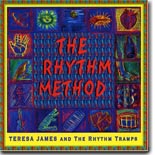 Texas transplant Teresa James, now residing in sunny Southern
California, knows a thing or two about barrelhouse boogie piano blues à
la Marcia Ball. Just take a listen to her recent release, The Rhythm
Method (Jesi Lu Records) and you’ll be well convinced like I
was.
Texas transplant Teresa James, now residing in sunny Southern
California, knows a thing or two about barrelhouse boogie piano blues à
la Marcia Ball. Just take a listen to her recent release, The Rhythm
Method (Jesi Lu Records) and you’ll be well convinced like I
was.
Aside from the obvious comparisons, a woman leading a band on piano with
musical tastes running from blues to soulful funk, James is a true
artist with a crack band, The Rhythm Tramps, taking us through 14 tunes
of very flavorful sounds nicely molding around her expert tinkling.
Starting off with her ivories shining James launches into "Nobody Rings
My Bell" with a fine-sounding horn section to better inform the listener
that this CD will kick some tush. Other gems to grab a hold off is the
sultry "Louisiana Moon" with its New Orleans references reminding us of
the city’s charms pre-Katrina and how one day we can all look forward to
the Crescent City once again. Another fine example of boogie piano
making us smile with its toe tapping rhythm is "Big Top Hat."
Slowing down a bit James shows off her voice on "Back Into Her
Heart,"solidifying the point that she just doesn’t have to sing in the
style accompanying the boogie piano she’s so well associated with. The
one cover that caught my ear was a beautiful rendition of the classic Al
Kopper/Blood Sweat and Tears tune, "I Love You More Than You’ll Ever
Know." Here, James really lets loose with her vocal prowess.
Ably backed by the Rhythm Tramps, James can easily play any style of
blues, R&B or funkified soul out there. Guitar chores are laid down well
by Billy Watts, bass thumping by Terry Wilson, who also produced the CD
and penned most of the songs, percussion and backing vocals by Debra
Dobkin, skins handled with wonderful beats by James Cruce and sax
compliments by Jerry Peterson. Add sometimes keyboard player with the
Who John “Rabbit “ Bundrick and throw in some of Delbert McClinton’s
backing band, and we have a tight, fun sounding band.
The Delbert McClinton connection goes beyond just loaning out his
backing band. James has been involved in McClinton’s Sandy Beaches
Cruise for the last couple of years. This cruise puts together a super
collection of artists that hit the Grand Cayman islands including
Belize. Unfortunately, you’re too late to join the “06” cruise as they
are sold out, but reservations should be opening up soon for the “07”
cruise. Getting the nod by an accomplished artist such as McClinton
certainly doesn’t hurt.
If Texas style blues and rock with rollicking piano is your cup of tea,
then quickly click onto James site and have yourself a good time at
www.teresajames.com.
Good Listening.
--- Bruce Coen
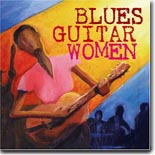 Over the years, quite a number of
women guitarists have more than held their own in the blues world (more
so than in any other musical genre), and Ruf Records has compiled a
two-disc set, appropriately entitled Blues Guitar Women, to
recognize this fact and pay homage to them. Handsomely packaged, with
great liner notes and biographies of each of the artists compiled by
guitarist Sue Foley, Blues Guitar Women takes a slightly
different approach to most compilations, featuring the artists in
reverse chronological order, and dividing the set into a contemporary
disc and a traditional disc.
Over the years, quite a number of
women guitarists have more than held their own in the blues world (more
so than in any other musical genre), and Ruf Records has compiled a
two-disc set, appropriately entitled Blues Guitar Women, to
recognize this fact and pay homage to them. Handsomely packaged, with
great liner notes and biographies of each of the artists compiled by
guitarist Sue Foley, Blues Guitar Women takes a slightly
different approach to most compilations, featuring the artists in
reverse chronological order, and dividing the set into a contemporary
disc and a traditional disc.
On the contemporary disc, there are a lot of familiar faces presented
(Foley, Joanna Connor, Debbie Davies, Deborah Coleman, Bonnie Raitt,
Alice Stuart, Barbara Lynn, Beverly “Guitar” Watkins), along with some
newer faces you may not have heard from yet (Tracy Conover, Ruthie
Foster, Ana Popovic, Eve Monsees, Carolyn Wonderland, Erja Lyytinen, and
Laura Chavez). Some of the tracks are instrumental and range from
Foley’s zesty “Mediterranean Breakfast" to Lynn’s funky “Lynn’s Blues”
to Popovic’s pensive “Navajo Moon.” Other highlights include the fiery
opening track by the Lara Price Band (featuring Chavez on guitar),
“Can’t Quit The Blues,” Wonderland’s “Judgement Day Blues,” Raitt’s
“It’s A Blessing” (with Maria Muldaur helping out on vocals), Foster’s
soulful “Woke Up This Mornin’,” and Traci Conover’s scorching cover of
Freddy King’s “Goin’ Down.”
The traditional disc is predictably a more sedate affair, and most of
the names will be recognizable ones to fans of traditional blues. Foley
and Stuart make appearances on this disc also, (Stuart’s treatment of
“Rather Be The Devil” is a keeper). Other standouts include Precious
Bryant’s “Fool Me Good,” Jessie Mae Hemphill’s “Streamline Train,” JoAnn
Kelly’s “One Dime Blues,” and a couple of appearances by Rory Block (one
solo and one with Uppity Blues Woman Gaye Adegbalola). There are also
some tracks by some of the ladies who blazed the trail for women
guitarists in the blues --- Mattie Delaney, Elvie Thomas, Geeshie Wiley,
and the undisputed Queen of Blues Guitar, Memphis Minnie, who influenced
most, if not all, of the women featured here (and a fair share of men as
well).
Blues Guitar Women is an excellent collection of some artists
you’ve already heard, some you might have heard of, and some you
definitely need to hear more of, and belongs in every blues fan’s
collection.
--- Graham Clarke
Bill Rhoades is well-known to
many blues fans in the Pacific Northwest, having been involved on the
blues scene there for over 40 years as a radio personality (on KBOO FM
in Portland, Oregon), as co-founder of the Cascade Blues Association, as
a concert and festival promoter, and as leader of The Party Kings,
who are slated to represent the CBA at the Annual International Blues
Challenge at Memphis in January, 2006. Rhoades is a fine singer and one
of the best harp men in the Northwest, and over the years, various
incarnations of The Party Kings have backed artists such as Albert
Collins, Robert Cray, Michael Bloomfield, Sonny Rhodes, and Jimmy
Rogers.
Fresh from winning two Muddy Awards
from the CBA (for Best Traditional Blues Band and Best Harmonica),
Rhoades and The Party Kings just released their debut CD for White Owl
Records. Voodoo Lovin’ is a solid release of traditional blues
ranging from recognizable covers, such as Gatemouth Brown’s “She Walks
Right In,” Muddy Waters’ “She Moves Me,” John Lee Williamson’s “Early In
The Morning,” and Tampa Red’s “Don’t You Lie To Me”, along with some
exceptional original compositions, like “Waiting and Worrying,” “I’m
Trying,” and “Hurt Again.”
Rhoades does a first-rate job on the
covers, but he is even more convincing on his own songs, maybe due to
the familiarity of some of the covers. The band, seasoned veterans all
(Michael Osborn on guitar, Tom Szell on bass, Johnny Moore on drums),
stands out on all tracks. Longtime friend and musical partner Terry Robb
produced this set and adds some torrid slide guitar to “She Moves Me.”
There’s nothing fancy here, just some
good old genuine traditional blues like they used to play way back when.
Bill Rhoades and The Party Kings will be tough to beat at the IBC in
January. This CD is available at
www.cdbaby.com.
--- Graham Clarke
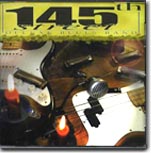 San Diego’s 145th Street Deluxe
Blues Band offer a blistering set of high-energy electric blues
guaranteed to get you on your feet with their recent self-titled
release. The disc features ten tracks, six of which are hard-driving
originals like “Roll The Dice,” “Snakeskin On My Feet,” and “You Is So
Mean,” along with four covers of time-honored tracks (Ray Charles’ “Mary
Ann,” and a revved-up version of Lowell Fulson’s “Reconsider Baby” being
the standouts).
San Diego’s 145th Street Deluxe
Blues Band offer a blistering set of high-energy electric blues
guaranteed to get you on your feet with their recent self-titled
release. The disc features ten tracks, six of which are hard-driving
originals like “Roll The Dice,” “Snakeskin On My Feet,” and “You Is So
Mean,” along with four covers of time-honored tracks (Ray Charles’ “Mary
Ann,” and a revved-up version of Lowell Fulson’s “Reconsider Baby” being
the standouts).
The band features Steve Bulger
contributing strong vocals and harmonica, Marco Marrewa providing some
intensely soulful guitar, and Rollin Rogers (bass), D. J. Jackson
(drums), and Mark “Doc” Holladay (keyboards) anchoring things down, and
these guys mesh like they’ve been playing together for years.
If high-energy, hard-driving
electric blues in the Chicago vein are what you’re looking for, look no
further. This enjoyable disc will have what you need. This CD is
available at
www.cdbaby.com and the band’s website,
www.145Street.com.
--- Graham Clarke
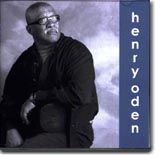 Bassist Henry Oden was a member
of Joe Louis Walker’s band, the Boss Talkers from the mid 80’s until the
mid ’90s, not only as Walker’s bass man, but also as a composer of
several of Walker’s songs during that time. Since then, he’s toured with
Sonny Rhodes, Maria Muldaur, and Craig Horton and has also recorded with
Horton, Jimmy Dawkins, Freddy Hughes, and Bernard Anderson. Prior to
joining Walker, in the '60s he toured with Jimmy Reed, Freddie King, Big
Mama Thornton, Mike Bloomfield, and many others.
Bassist Henry Oden was a member
of Joe Louis Walker’s band, the Boss Talkers from the mid 80’s until the
mid ’90s, not only as Walker’s bass man, but also as a composer of
several of Walker’s songs during that time. Since then, he’s toured with
Sonny Rhodes, Maria Muldaur, and Craig Horton and has also recorded with
Horton, Jimmy Dawkins, Freddy Hughes, and Bernard Anderson. Prior to
joining Walker, in the '60s he toured with Jimmy Reed, Freddie King, Big
Mama Thornton, Mike Bloomfield, and many others.
Oden has released a self-titled CD on
CP Time Music that shows not only his blues leanings, but also gives old
school funk and R&B plenty of space as well. “Madame Zorra and Sister
Rose” is a slice of New Orleans funk, and “Book of Lies” is equally deep
in the funk as well. For fans of ’70s era R&B, there’s “I Didn’t Mean 2
Hurt U,” “You Just Don’t Know,” and “Best Choice.” “71730” is a jazzy
instrumental with Oden showing some formidable guitar chops. The blues
are featured on “Even If It’s Wrong” and “Rock.” Oden lays down some
nasty bass and guitar and gets some good solid support from the band.
If you like your blues mixed in with
healthy doses of funk and R&B, check this one out at
www.henryoden.com.
--- Graham Clarke
The John Earl Walker Band’s
latest release, People Are Talking (Walkright Music),
features more of the same of their hard-edged blues/rock sound, but this
time there’s more of a blues edge to the proceedings. Walker, who has
toiled for many years on the New York music scene, seems to have found
the right combination on this release. His guitar work is just
outstanding, particularly on selections like “It’s All Up To You,” and
“Introductory Plan”, and his gruff vocals are what the doctor ordered on
tracks like the title cut, “Introductory Plan,” “Lyin’ and Cheatin’,”
and “Too Sad To Weep.”
The band, including Peter Harris on
bass, Bobby Infante on drums, Joey Tremelo on guitar, Johnny Byrne on
harmonica, and Gene Cordew on keyboards provide steady and dependable
backing for Walker. Although all the tracks have their merits, Walker
saved the best for last with “Welcome Back Mr. Blues,” a nearly seven
minute blues tour de force with plenty of powerful blues guitar that you
hate to hear come to an end. Fans of blues/rock will really love this
one.
--- Graham Clarke
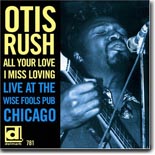 Delmark
Records has been digging into its vault and has pulled out a rare gem:
Otis Rush’s All Your Love I Miss Loving – Live at the Wise
Fools Pub, Chicago, a recording of a live radio broadcast that
originally aired on Chicago’s WXRT radio in 1976. The record is chock
full of classic Rush performances and a wonderful live recording given
the technology available at the time.
Delmark
Records has been digging into its vault and has pulled out a rare gem:
Otis Rush’s All Your Love I Miss Loving – Live at the Wise
Fools Pub, Chicago, a recording of a live radio broadcast that
originally aired on Chicago’s WXRT radio in 1976. The record is chock
full of classic Rush performances and a wonderful live recording given
the technology available at the time.
Otis starts the party rolling with a rousing rendition of "Please Love
Me," imploring “Baby, please be my girlfriend, honey, I’ll be your boy.”
It’s a fast-paced anthem of love that features frenetic guitar work by
Otis. Just a great way to open up the show. "You’re Breaking My Heart"
slows the pace down and laments the fact that his love has chosen to
move on and is causing him great pain with her decision. Sweet, soulful
guitar solos emphasize the heartbreak that Otis is feeling at the loss
of this love.
"All Your Love" finds Otis in a much happier mood. “Before I met you
baby…I didn’t know what I was missing.” Infectious fretwork empowers the
listener to feel Rush’s joy at this new love and it makes you want to
just get up and dance. "Will My Woman Be Home Tonight" is an
instrumental track by Otis that musically wonders out loud if indeed,
“Will my woman be home tonight?” I’m left wondering if she did come
home…only Otis knows the answer for sure.
We continue to feel Otis’ pain with "Mean Old World" …. ”If you didn’t
love me woman…why oh why did you treat me right?” Son House said it
best…”There ain’t but one kind of blues and that’s the feelings between
a woman and a man.” Otis definitely has those blues. In "Woke Up This
Morning" we learn that she indeed has left and Otis is pleading his
casev…”Baby…you need a man like me….I’m so alone…..ain’t had no loving
since my baby’s been gone.” You just know she isn’t coming back.
"High Society" finds Otis moving uptown into a neighborhood he probably
doesn’t belong in. His high society woman takes all his money…..keeps
him on a string…..eats steak & chicken while he gets chitlin stew. Rush
finally realizes that all is not right….”this love’s not worth the price
I pay.” "It Takes Time" finds the shoe on the other foot…”today you’re
laughing pretty baby…tomorrow you could be crying” is Otis’s
admonishment to his current flame because he realizes this particular
love is slowing down…it’s time to move on.
In "Gambler’s Blues" we find Otis using gambling as a metaphor for love.
“Don’t know much about gambling….don’t know much about dice…don’t know
much about love….don’t know much about life.” Love is a gamble, but at
least Otis is willing to play. He concedes on "Feel So Bad" that he did
indeed ”receive a dirty deal.” Sometimes you win in love…sometimes you
lose…but at least he keeps trying.
Inspired playing and vocals highlight Rush’s rendition of the B.B. King
classic "Sweet Little Angel" Just a wonderful addition to a classic set
by Otis. The closing song on the record, "Motoring Along," is another
instrumental by Otis and the band, giving them one last chance to
display their amazing abilities in a fast-paced shuffle.
Live at the Wise Fools Pub is a very well-done live recording of
Otis Rush. It has an analog album feel to it but the production of this
recording is outstanding. I didn’t feel like I was at the Wise Fools
Pub….but I knew I wished I would have been there.
--- Kyle Deibler
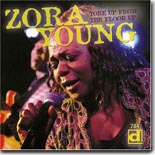 “Came out kicking, going down swinging,” a comment from her interview at
the end of Tore Up From the Floor Up, aptly describes Zora
Young’s latest release on Delmark Records. Zora’s record is at times
soothing, sweltering, joyful and sad, but most of all it is a joyous
reminder of the wonderful talents of this wonderful Chicago blues
artist.
“Came out kicking, going down swinging,” a comment from her interview at
the end of Tore Up From the Floor Up, aptly describes Zora
Young’s latest release on Delmark Records. Zora’s record is at times
soothing, sweltering, joyful and sad, but most of all it is a joyous
reminder of the wonderful talents of this wonderful Chicago blues
artist.
"Love of Mine" is a heartfelt anthem of love about Zora’s current flame.
The time comes when he has to leave and he’s admonished to “be a man
about…don’t be sneaking out my back door.” It’s apparent that Zora is a
strong woman who isn’t about to be disrespected in any fashion. "Go
Ahead and Take Him" shares Zora’s thoughts on her man that’s done her
wrong. “Go ahead and take him…..take away my misery….I know he’s going
to sneak around and cheat on you….just like he’s done to me.” You just
know that whatever happens next to the woman who has Zora’s man is just
rewards….she’s been warned.
Things pick up on "I’m Gonna Do the Same Thing They Did to Me"; in her
next relationship her man is going to toe the line. He has to have a
job, bring the money home, pay the rent and treat like a queen. Only
then will Zora be satisfied. "Toxic" brings with it the thought that the
best thing to do is clean house…..”and put away the toxic things from my
past.” Zora can’t seem to shake the bad memories from her past
relationship but she’s working hard to get her life (and house) in
order. Only by putting away her toxic memories can she move on.
Even though times are tough, in "Til the Fat Lady Sings," Zora reminds
us that nothing is over until she says it is. The neighborhood is
changing….houses are being built to drive her out of the projects but
even though times are tough…..they aren’t over. A tender ballad,
"Slowly," reminds us that Zora is still a woman of great passion…..”I
don’t mind if you take a little longer….I know the results will be much
stronger…..slowly…it’s alright!” Her current lover is obviously a man
that Zora wants to make her own.
In "Ace of Spades," Zora reminds her current amour that she knows the
game and can play it better then he can…”I’m the one who brought it
here….I’m the ace of spades….listen to me baby…you just can’t win…the
places you’re trying to go I’ve already been…I’ll still be the ace of
spades when you get back!” "Rainy Night in Georgia" showcases the R & B
depth of Zora’s talents. It’s warm, sultry….simmering with passion….very
well done.
"Tore Up From the Floor Up," the title song of the album, finds Zora
imploring her lover to please come home. “I didn’t know I would miss you
until you were gone. It seems he was a better man than Zora thought. But
he’s definitely gone. Things slow way down with Zora’s cover of "Since I
Fell For You/Silhouette." This time the shoe’s on the other foot and
Zora is at a disadvantage because of her love for this man. You feel her
pain for loving this man but it is what it is. She loves this man.
"Handy Man" exudes confidence that now I’ve got a good man. “Hoochie
mamas leave this one alone…..he’s my Handy Man!” This is one man who
definitely is treating Zora right. Closing out the album is the rhythmic
"Two Trains Running," a lament that Zora is having about her affair with
a married woman’s husband. There are two trains running….”One around
midnight…..and one before the break of day.” Even though this cheating
man is alright by Zora….she’d be better of to be on her way.
Tore Up From the Floor Up concludes with a short interview with
Zora discussing her Mississippi roots, her move to Chicago and her
challenges as a female singer. Zora’s definitely been underrecorded and
underappreciated. Hopefully this outstanding record will help to change
all of that.
--- Kyle Deibler
Fresh for the holidays, MC Records has released a wonderful live
recording by Odetta, entitled Gonna Let It Shine. An
eclectic mix of spirituals and holiday songs, Gonna Let It Shine
features Seth Farber on piano and the Holmes Brothers singing on three
of the tracks recorded at a concert sponsored by WFUV public radio at
Fordham University in New York. The result is a classic Odetta recording
in celebration of the human and Christmas spirit.
In typical Odetta fashion, she begins the evening with a quote from
Marianne Williamson, “Our worst fear is not that we are inadequate, our
deepest fear is that we are powerful beyond a measure…….we were born to
make manifest the glory of god within us……..and as we let our own light
shine, we unconsciously give other people permission to do the
same…….our presence automatically liberates others.” Odetta has been a
conscious voice within the social fabric of our country for well on 50
years and continually encourages everyone to search within to live,
learn and grow. What follows is a powerful rendition of "Let It Shine"
with the Holmes Brothers singing background vocals. Emotional,
spiritual, uplifting….."Let It Shine" is a powerful introduction to a
wonderful set of songs featured throughout the evening.
As the evening continues Odetta shares the history of a number of
spiritual songs with the context of slavery. There is a period of time
late in the year when work slows down after the harvest and blacks had
the opportunity celebrate the seasons. They were able to equate stories
from the Bible and Jewish communities to their own struggles. The result
is a number of wonderful spirituals. "Rise Up Shepard," "Mary Had a
Baby" and "What Month Was Jesus Born In" are classic examples of the
black spirituals. "What Month Was Jesus Born In" is a spiritual that
evolved as a way to teach the children the months of the year. Within
the oppression of slavery, the children were not allowed to learn how to
read and so a number of great life lessons were taught within the
context of song.
Odetta continues on with rousing renditions of "Shout for Joy" and
"Virgin Mary Had One Son." Her multi-octave voice is put to good use and
is impressive throughout. Her ability to go “down in the basement” ala
Koko Taylor and then hit extreme high notes is nothing short of amazing.
The Holmes Brothers join her again on a wonderfully expressive version
of "Down By the Riverside," and the audience’s appreciation of the
evening is readily apparent.
"Poor Little Jesus" is followed by the wonderfully expressive "Freedom
Trilogy," a collection celebrating the joys of heaven versus the
oppression of slavery. Freedom, no matter how it is obtained, is always
the preferred rout to go.
Odetta continues to take you on a magical journey with the spirituals
"Somebody Talking About Jesus," "Keep On Moving It On," "O Jerusalem"
and "If Anybody Asks You." before closing with a rendition of
Leadbelly’s "Midnight Special." In the early 1900s there were
penitentiary laws that served as a means of enforced slavery. A number
of black men were arrested for what were minor offenses and committed to
work groups to perform menial tasks for the public benefit, i.e.,
cracking rocks for use in paving roads, etc. "Midnight Special" is a
spiritual these men sang while working to take their minds off the
oppressive nature of the work they were doing.
I find Odetta’s social commentary to be thought provoking and
masterfully woven within the context of her entire concert presentation.
She’s been challenging our thoughts and our social concepts all her life
and I’m sure will continue to do so. Gonna Let It Shine isn’t
just a celebration of the holiday season; it’s a celebration of life for
all seasons.
--- Kyle Deibler
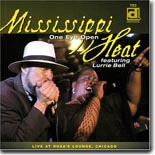 One Eye Open – Live at Rosa’s Lounge is the
latest Delmark release for Mississippi Heat, and it’s another
great live recording released by Delmark. Pierre Lacocque’s outstanding
harmonica leads are featured along with Inetta Visor on vocals and
Lurrie Bell sitting in on guitar & vocals….One Eye Open is a
great Chicago Blues live recording.
One Eye Open – Live at Rosa’s Lounge is the
latest Delmark release for Mississippi Heat, and it’s another
great live recording released by Delmark. Pierre Lacocque’s outstanding
harmonica leads are featured along with Inetta Visor on vocals and
Lurrie Bell sitting in on guitar & vocals….One Eye Open is a
great Chicago Blues live recording.
Opening with an instrumental, the aptly named
"Rosa's Strut," features blistering harp playing by Lacocque and
sets the tone for what had to be a rowdy evening at Rosa’s. Lurrie picks
up the vocals on "19 Years Old," the classic song about love with a
younger woman. Pierre’s harp leads strongly support Lurrie’s lament
throughout this song that no matter what he does….he just can’t keep the
girl satisfied.
"I’ve Got to Sleep with One Eye Open" brings Inetta
Visor to the forefront as the female lead singer of Mississippi Heat.
With references to the current TV shows Sex in the City and Desperate
Housewives, Inetta intones that every now and then a woman can find a
man who is just too much in the bedroom…..sleeping with one eye open
helps fend off his advances at those times when our girl’s just not up
to it. "Dirty Deal" offers an alternative view….sometimes good love
turns bad and it just goes south….”it became crystal clear….he just gave
me a dirty deal!”
"Honest I Do" slows things way down with a
wonderfully expressive vocal by Lurrie. Accompanied by Pierre’s soulful
harmonica leads, "Honest I Do" simmers with Lurrie’s passion for the
woman he loves. Just a great cover and one of the highlights of this
record. "Rock Steady" brings Inetta back to the microphone and
features some inspired keyboard playing by Chris “Hambone”
Cameron. "Rock Steady’s" upbeat groove got everyone at Rosa’s off their
butts and on to the dance floor…there’s just no way it couldn’t have.
Kenny Smith on drums, Spurling Banks on bass and Max Valldeneau on
guitar round out Mississippi Heat and form a strong supporting to Inetta,
Lurrie and Pierre on the record.
"Jukin" opens up the second half of the show at
Rosa’s and is a lively instrumental featuring Hambone Cameron’s keys and
Pierre’s harmonica. It definitely warms you up for what is yet to
come. Curiously enough, what follows is the slow ballad "Cold, Cold
Feeling." Lurrie again takes the microphone to describe the
feeling way down deep in his heart. Pierre’s soulful harmonica
intonations support Lurrie’s feeling of despair at his love gone wrong.
Very well done.
On "Cool Twist" Inetta is encouraging everyone to
take their time and just enjoy the dance. You can dance the twist
together or just find your groove on your own….just enjoy. On "She Ain’t
Your Toy" Inetta is commenting on advice she gave a male friend
about his woman’s love is running cold. “A woman is your equal…don’t
mess without her…she’ll soon be leaving you…if you listen to what I’m
saying….she’ll give you peace and joy!” "She Ain’t Your Toy" offers age
advice for any man looking to keep his woman satisfied and in his
life. Just ask Inetta….she’ll set you straight.
Mississippi Heat closes out their recording with
the instrumental "Listen Here." It’s apparent in their final song
that Mississippi Heat is a group of very talented musicians. Delmark
thought enough of this project to film the event for DVD as well and I
for one can’t wait to see it. One Eye Open – Live at Rosa’s Lounge
had to be one of the best parties thrown in Chicago this last year. I’m
just sorry I missed it.
--- Kyle Deibler
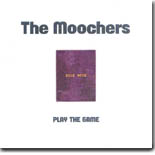 The
third album from The Moochers has arrived ! The band, formed in
1994 by Mat Walklate & Pyatt, is still going strong even though Andy
Pyatt has now relocated himself to France. The band continues to be
based in the Manchester area of England, and judging by their latest CD,
Play The Game, they are still determined to produce good music.
The
third album from The Moochers has arrived ! The band, formed in
1994 by Mat Walklate & Pyatt, is still going strong even though Andy
Pyatt has now relocated himself to France. The band continues to be
based in the Manchester area of England, and judging by their latest CD,
Play The Game, they are still determined to produce good music.
The album has 14 original tracks, most of them written by Walklate &
Pyatt, with guitarist Dave Lunt making a contribution to the last track,
a moody number entitled “40tude.” The opening track is “Listen To Me,”
an up-tempo blues with some interesting guitar work and with Mat
Walklate sounding very reminiscent of Ian Anderson of Jethro Tull! This
track is a good choice for the opening number, and grabs the listener’s
attention, but track two, “House Of Cards,” is a better blues track,
from my point of view. It’s got some unusual harmonica playing above a
driving beat, and great guitar work which is kept in the background, so
that it doesn’t detract from the vocals. This is a well-written and
well-executed number, and has my vote as the best on the album.
As track three opens up (the title track “Play The Game”) you start to
realize that this band has something to say, knows the blues, and that
the album is getting going nicely. Pyatt’s guitar is given a bit more
exposure here, and he takes advantage of that fact to show what he can
do.
The following tracks, “Goin’ Away,” “Hide And Seek” and “Lubrication,”
are excellent, bluesy, and full of good lyrics. But then track seven,
“Smiling Face,” comes in. I’m not sure exactly why this track was
included – it’s not bluesy and it’s not a patch on the preceding tracks.
Having said that, it’s the only low point on the CD for me – and I must
stress that it’s just a personal view – it could well appeal to other
listeners, as it’s not a bad track.
Back into some funky blues with track eight, “Look Down,” and from here
to end of the album it’s all good blues to listen to. Track ten has some
obvious Dire Straits influence, especially on the guitar work, but
that’s not a bad thing and it certainly adds a bit more interest. Track
12, “Take It Easy,” comes very close to being my choice from the album,
and is a very close second to “House Of Cards” – these two tracks alone
make this CD worth having in any blues collection.
--- Terry Clear